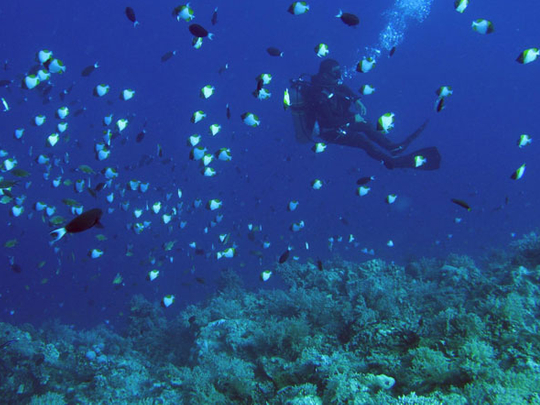
Dubai: Seventeen years ago marine scientists seemed at odds on whether or not the ocean's coral reefs were healthy. Some were adamant all corals were dead while others told tales of pristine waters and thriving coral ecosystems. In fact too few surveys had been conducted to identify the global status of reefs which left gaps in the research.
A couple of years later in 1997, a simple methodology to identify certain creatures and situations representative of human impacts on coral reefs was developed, and Reef Check was born. It was devised for volunteers with a scuba diving licence and one did not have to be a marine biologist or even a good diver to chip in.
The training procedure includes learning about indicator species whose numbers tell a story of what is going on underwater.
Indicator species
Certain species like groupers, sea cucumbers or the coral-banded shrimp are considered indicator species due to the high demand for them in local and international markets. Marine protected areas are often set up around reefs to act as nurseries, letting fish reach reproductive age to replenish their stock. In 1996 however it was already recognised that more than 25 of the world's most valuable fisheries had been seriously depleted.
Reef Check surveys differ for the Indo-pacific region and the Atlantic. And now studies are ongoing in the Arabian Gulf to potentially develop a specific Reef Check for this region.
"The Arabian Gulf has a high salinity and high temperatures which make the corals that survive here very tough," said Rita Bento, marine biologist and Reef Check scientist working for the Emirates Diving Association (EDA). "How did the corals adapt here? It is very important and we need to protect them because they may help us understand what will happen around the world with climate change and rising sea temperatures. They may hold the answer for other corals. Some die with the heat but some thrive."
Simple sessions
EDA started training Reef Check volunteers in 2008 and so far, 56 divers are qualified. In just three days spread over two weekends, classroom sessions and a test dive, anyone can get involved.
Coral reefs are covered in miniscule algae that, like any plant, depend on sunlight to filter through the water to photosynthesize. Anything that stops the sunlight from reaching the corals like turbidity, algae blooms or sedimentation can have negative impacts — and all are noted by reef checkers.
"EDA Reef Check has helped us to collect data in a scientific way which will help us and other environmental bodies in the UAE to know the conditions of our coral reefs," said Ebrahim Al Zu'bi, executive director of EDA. "It brings us closer to the international marine conservation community."
Adel Abu Haliqa, 38, an Emirati freediving national record holder completed his Reef Check training last year and now helps out with data collection frequently. "It really changes the way you look at things under water," he said.
"After doing the reef checks and accumulating data the reports can be taken to the authorities and the findings can be shared with society. I think the oceans were much healthier before, there is lack of awareness on environmental issues," he said. "Before people knew more about their environment."
Study parameters vary according to location
- Reef Check surveys differ for the Indo-Pacific region and the Atlantic.
- Studies are on to potentially develop a specific Reef Check for Arabian Gulf.
- More than 25 of the world's most valuable fisheries have been seriously depleted.












